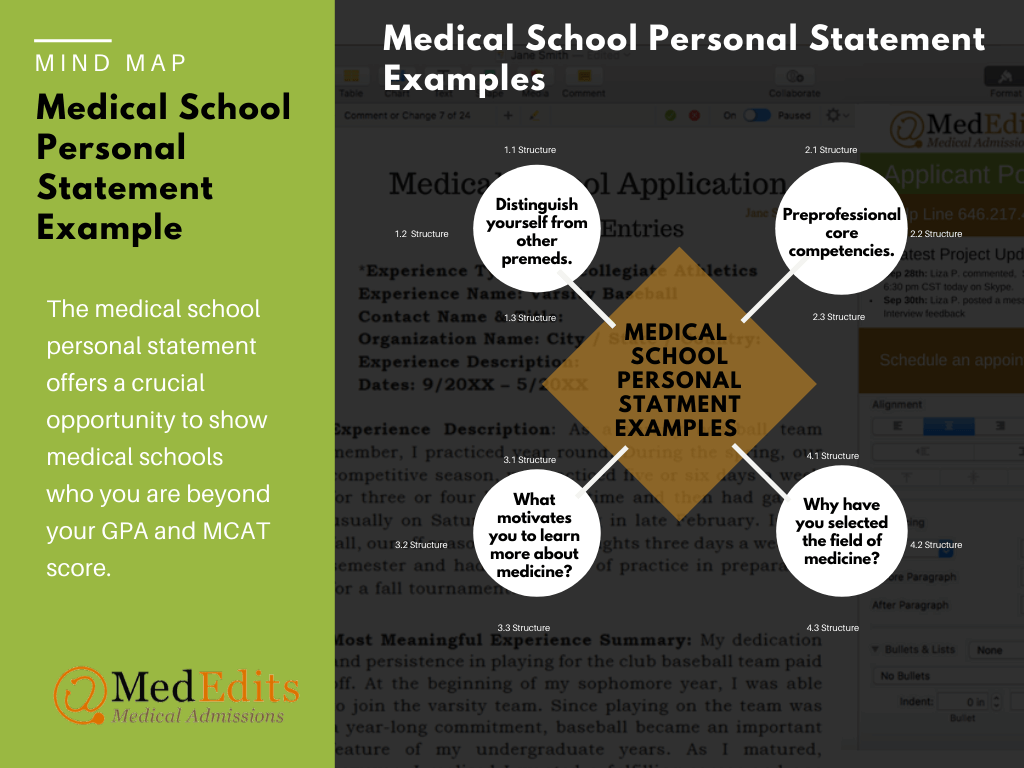
In this article, a former medical school admissions officer explains exactly how to write a stand-out medical school personal statement!
Our goal is to empower you to write a medical school personal statement that reflects your individuality, truest aspirations and genuine motivations.
This guide also includes:
So, if you want your medical school personal statement to earn more more medical school interviews, you will love this informative guide.
Let’s dive right in.
Table of Contents
If you are getting ready to write your medical school personal statement for the 2024-2025 application year, you may already know that almost 60% of medical school applicants are not accepted every year. You have most likely also completed all of your medical school requirements and have scoured the internet for worthy medical school personal statement examples and guidance.
You know the medical school personal statement offers a crucial opportunity to show medical schools who you are beyond your GPA and MCAT score.
It provides an opportunity to express who you are as an individual, the major influences and background that have shaped your interests and values, what inspired you to pursue medicine, and what kind of a physician you envision yourself becoming.
However, with so much information online, you are not sure who to trust. We are happy you have found us!
Because the vast majority of people offering guidance are not former admissions officers or doctors, you must be careful when searching online.
We are real medical school admissions insiders and know what goes on behind closed doors and how to ensure your medical school personal statement has broad appeal while highlighting your most crucial accomplishments, perspectives, and insights.
With tight limits on space, it can be tough trying to decide what to include in your medical school personal statement to make sure you stand out. You must think strategically about how you want to present your personal “big picture” while showing you possess the preprofessional competencies med schools are seeking.
When a medical school admissions reviewer finishes reading your medical school personal statement, ask yourself:
It’s pretty obvious to most admissions reviewers when applicants are trying too hard to impress them. Being authentic and upfront about who you are is the best way to be a memorable applicant.
“After sitting on a medical school admissions committee for many years, I can tell you, think strategically about how you want to present your personal “big picture.” We want to know who you are as a human being.”
The most common medical school personal statement mistake we see students make is that they write about:
By including details on what you have accomplished and how, you will make yourself sound like every other medical school applicant.
Most medical school applicants are involved in similar activities: research, clinical work, service, and social justice work.
To stand out, you must write from the heart making it clear you haven’t marched through your premedical years and checking boxes.
We also strongly discourage applicants from using ChatGPT or any AI bot to write their medical school personal statement. Writing in your own voice is essential and using anything automated will undermine success.
MedEdits students stand out in the medical school personal statement because in their personal statements they address:
WHY they have accomplished what they have.
In other words, they write in more detail about their passions, interests, and what is genuinely important to them.
It sounds simple, we know, but by writing in a natural way, really zeroing in on WHY YOU DO WHAT YOU DO, you will appeal to a wide variety of people in a humanistic way.
MedEdits students have done extremely well in the most recent medical school admissions cycle. Many of these applicants have below average “stats” for the medical schools from which they are receiving interviews and acceptances.
Why? How is that possible? They all have a few things in common:
Keep reading for a step by step approach to write your medical school personal statement.
By following the proven strategies outlined in this article, you will be and to write a personal statement that will earn you more medical school interviews. This proven approach has helped hundreds of medical school applicants get in to medical school the first time they apply!

The personal statement is the major essay portion of your primary application process. In it, you should describe yourself and your background, as well as any important early exposures to medicine, how and why medicine first piqued your interest, what you have done as a pre med, your personal experiences, and how you became increasingly fascinated with it. It’s also key to explain why medicine is the right career for you, in terms of both personal and intellectual fulfillment, and to show your commitment has continued to deepen as you learned more about the field.
The personal statement also offers you the opportunity to express who you are outside of medicine. What are your other interests? Where did you grow up? What did you enjoy about college? Figuring out what aspects of your background to highlight is important since this is one of your only chances to express to the med school admissions committee before your interview what is important to you and why.
However, it is important to consider the actual personal statement prompt for each system through which you will apply, AMCAS, AACOMAS, and TMDSAS, since each is slightly different.
Getting into a medical school has never been more competitive. Let the experts at MedEdits help you with your medical school application materials. We’ve worked with more than 5,000 students and 94% have been admitted to medical school.
Schedule a free 15 Minute Consultation with a MedEdits expert.
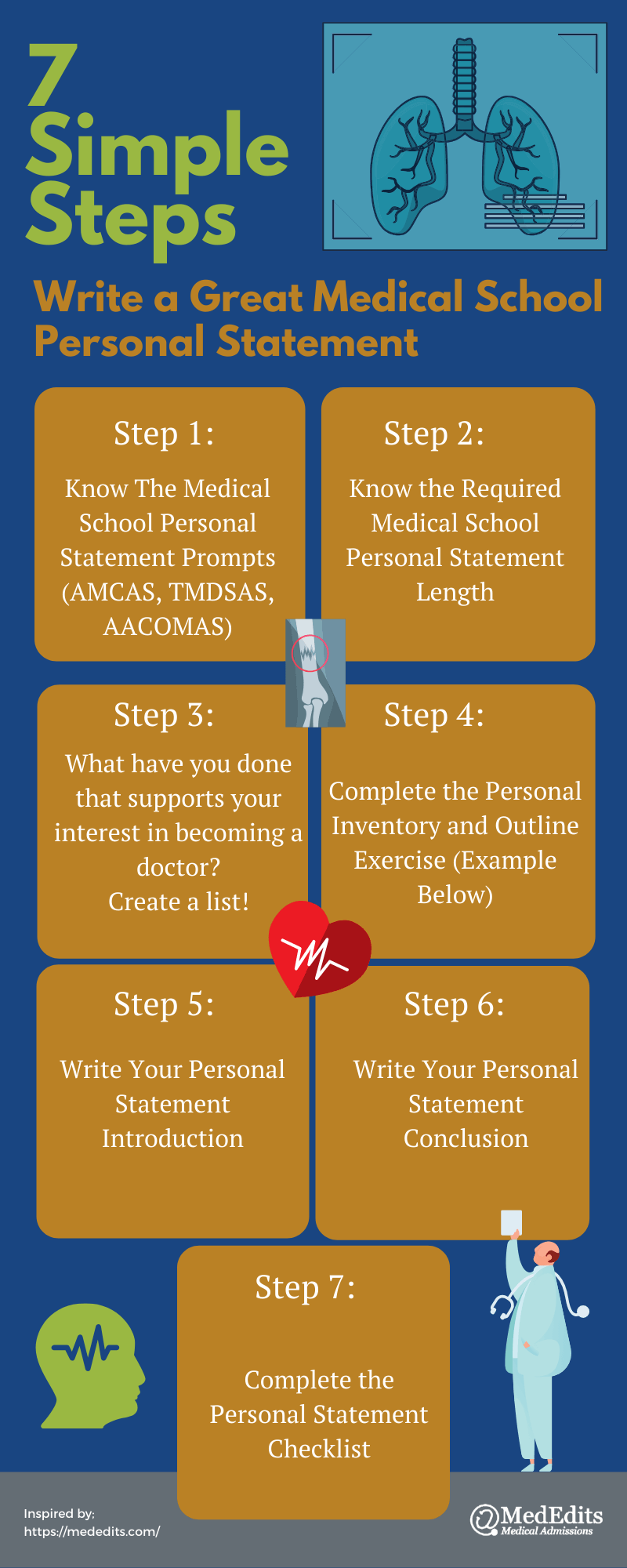
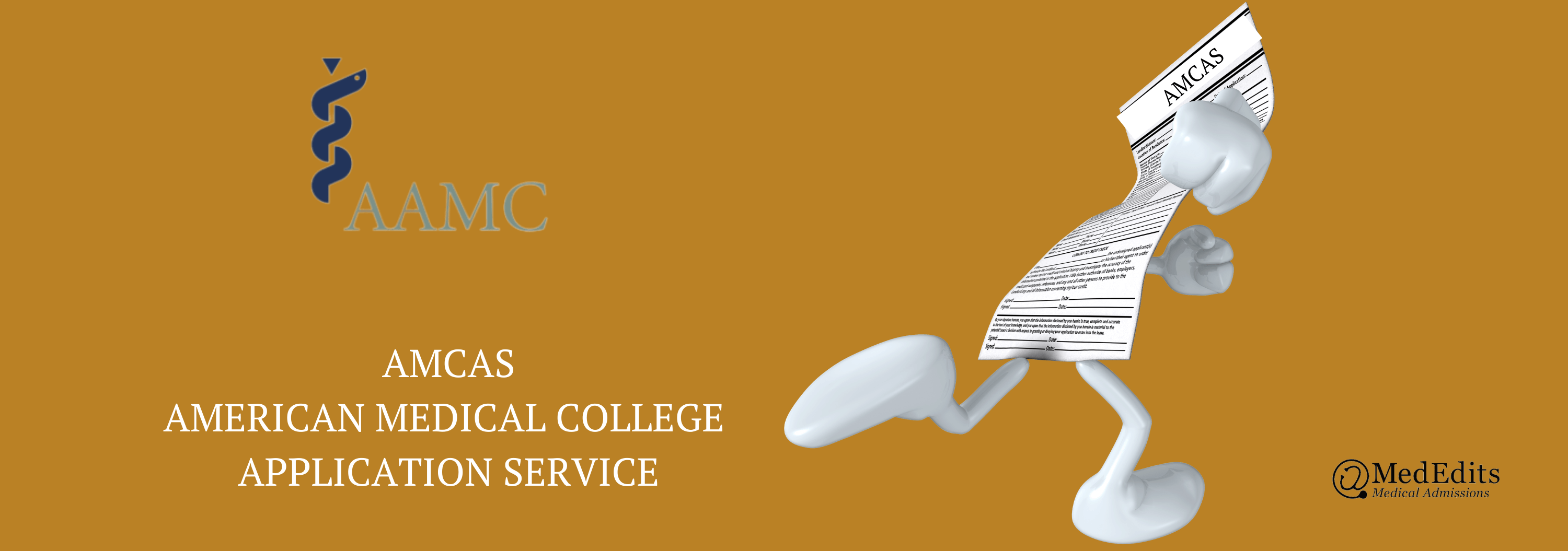
The AMCAS personal statement instructions are as follows:
Use the Personal Comments Essay as an opportunity to distinguish yourself from other applicants. Consider and write your Personal Comments Essay carefully; many admissions committees place significant weight on the essay. Here are some questions that you may want to consider while writing the essay:
In addition, you may wish to include information such as:
As you can see, these prompts are not vague; there are fundamental questions that admissions committees want you to answer when writing your personal statement. While the content of your statement should be focused on medicine, answering the open ended third question is a bit trickier.
The AMCAS personal statement length is 5,300 characters with spaces maximum.
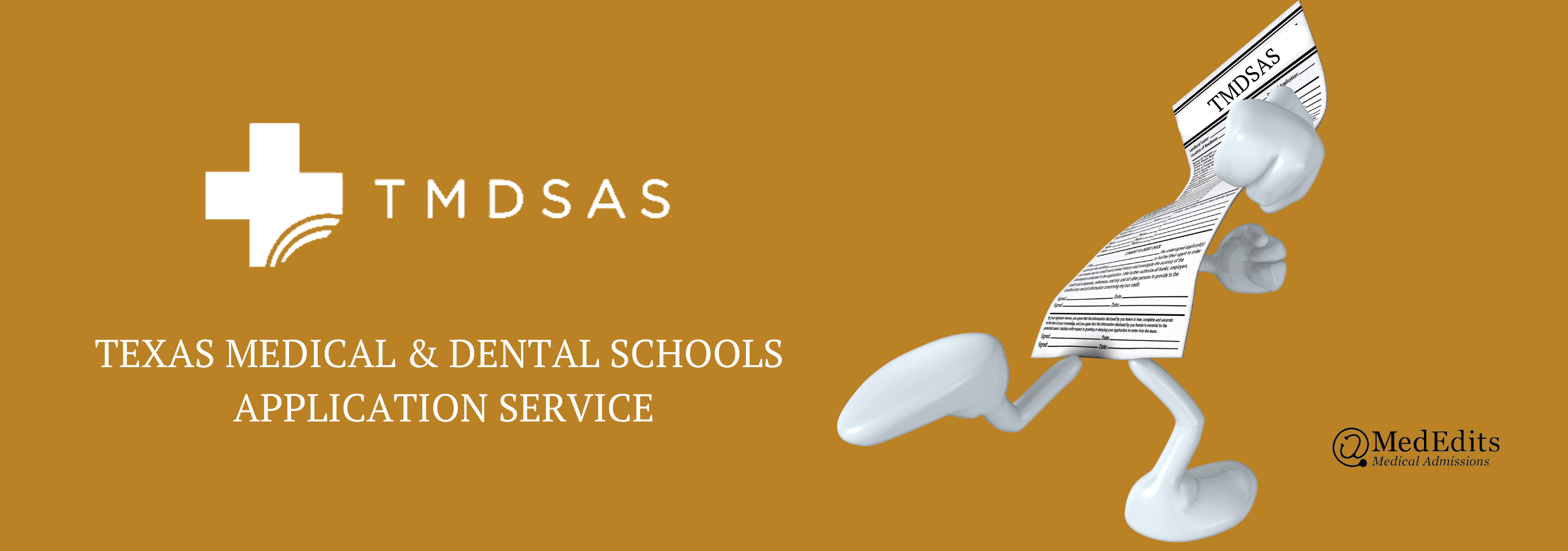
The TMDSAS personal statement is one of the most important pieces of your medical school application.
The TMDSAS personal statement prompt is as follows:
Explain your motivation to seek a career in medicine. Be sure to include the value of your experiences that prepare you to be a physician.
This TMDSAS prompt is very similar to the AMCAS personal statement prompt. The TMDSAS personal statement length is 5,000 characters with spaces whereas the AMCAS personal statement length is 5,300 characters with spaces. Most students use the same essay (with very minor modifications, if necessary) for both application systems.
You’ve been working hard on your med school application, reading medical school personal statement examples, editing, revising, editing and revising. Make sure you know where you’re sending your personal statement and application. Watch this important medical school admissions statistics video.
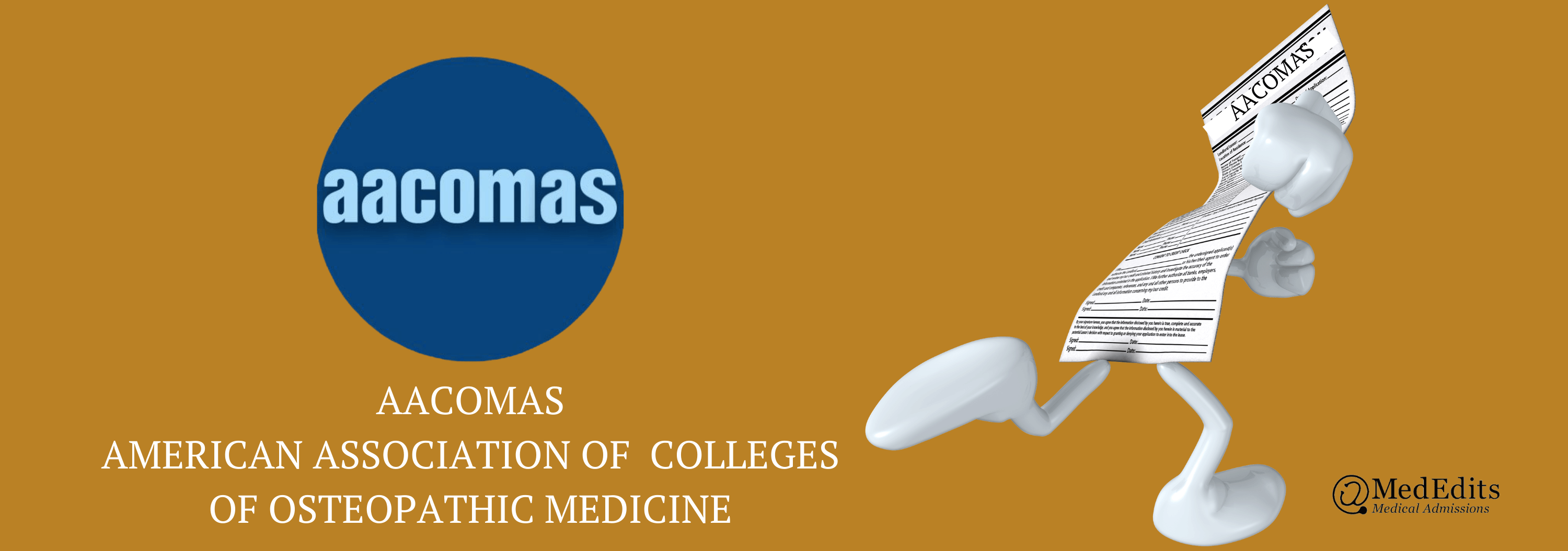
The AACOMAS personal statement is for osteopathic medical schools specifically. As with the AMCAS statement, you need to lay out your journey to medicine as chronologically as possible in 5,300 characters with spaces or less. So you essentially have the same story map as for an AMCAS statement. Most important, you must show you are interested in osteopathy specifically. Therefore, when trying to decide what to include or leave out, prioritize any osteopathy experiences you have had, or those that are in line with the osteopathic philosophy of the mind-body connection, the body as self-healing, and other tenets.
Medical School Application Timeline and When to Write your Personal Statement
If you’re applying to both allopathic and osteopathic schools, you can most likely use the same medical school personal statement for both AMCAS and AACOMAS. In fact, this is why AACOMAS changed the personal statement length to match the AMCAS length several years ago.
Most medical school personal statements can be used for AMCAS and AACOMAS.
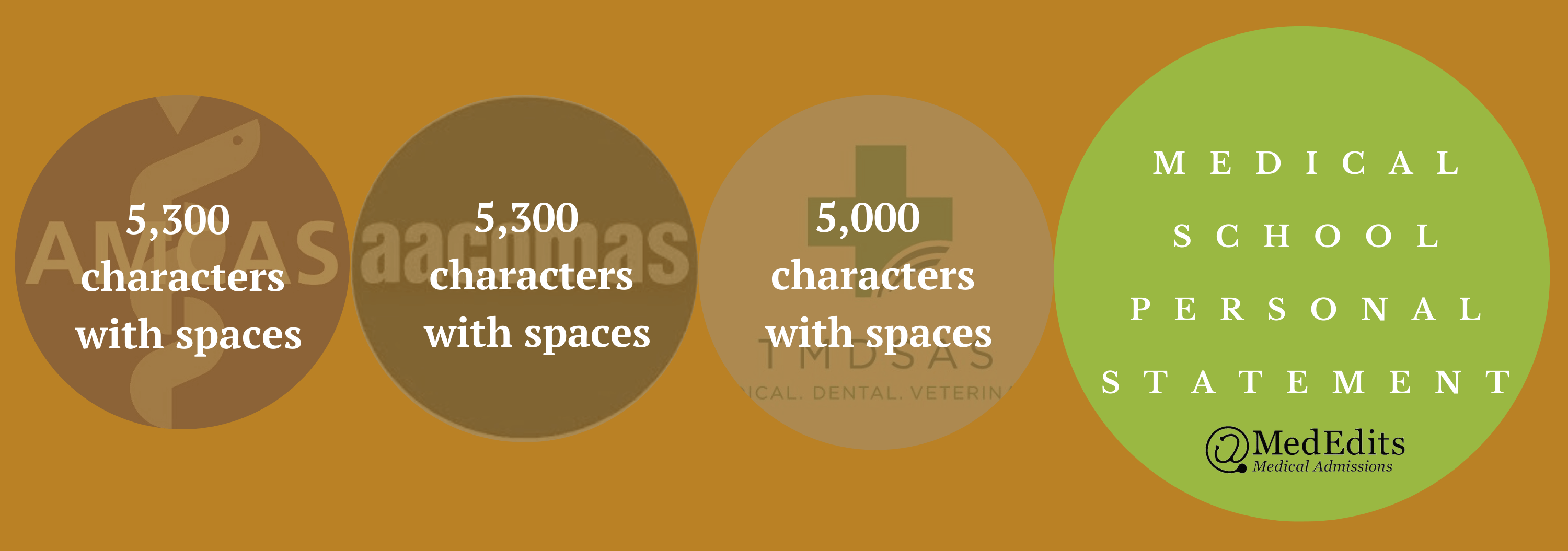
Below are the medical schools personal statement length limits for each application system. As you can see, they are all very similar. When you start brainstorming and writing your personal statement, keep these limits in mind.
As per the AAMC website : “The available space for this essay is 5,300 characters (spaces are counted as characters), or approximately one page. You will receive an error message if you exceed the available space.”
As per the TMDSAS Website (Page 36):“The personal essay asks you to explain your motivation to seek a career in medicine. You are asked to include the value of your experiences that prepare you to be a physician. The essay is limited to 5000 characters, including spaces.”
Addressing the Personal Statement Prompts So, let’s think about how to address the personal statement prompts in a slightly different way while ensuring you demonstrate the preprofessional competencies. When writing your personal statement, be sure it answers the four questions that follow and you will “hit” most of the core competencies listed above.
1. What have you done that supports your interest in becoming a doctor? I always advise applicants to practice “evidence based admissions.” The reader of your essay wants to see the “evidence” that you have done what is necessary to understand the practice of medicine. This includes clinical exposure, research, and community service, among other activities.
2. Why do you want to be a doctor?
This may seem pretty basic – and it is – but admissions officers need to know WHY you want to practice medicine. Many applicants make the mistake of simply listing what they have done without offering insights about those experiences that answer the question, “Why medicine?” Your reasons for wanting to be a doctor may overlap with those of other applicants. This is okay because the experiences in which you participated, the stories you can tell about those experiences, and the wisdom you gained are completely distinct—because they are only yours.
“In admissions committee meetings we were always interested in WHY you wanted to earn a medical degree and how you would contribute to the medical school community.”
Medical school admissions committees want to know that you have explored your interest deeply and that you can reflect on the significance of these clinical experiences and volunteer work. But writing only that you “want to help people” does not support a sincere desire to become a physician; you must indicate why the medical profession in particular—rather than social work, teaching, or another “helping” profession—is your goal.
3. How have your experiences influenced you?
It is important to show how your experiences are linked and how they have influenced you. What motivated you from your experiences? In what ways did they influence your other activities? How were your future goals shaped by these experiences? Medical school admissions committees like to see a sensible progression of involvements. While not every activity needs to be logically “connected” with another, the evolution of your interests and how your experiences have nurtured your future goals and ambitions show that you are motivated and committed.
4. Who are you as a person? What are your values and ideals?
Medical school admissions committees want to know about you as an individual beyond your interests in medicine, too. This is where answering that third open ended question in the prompt becomes so important. What was interesting about your background, youth, and home life? What did you enjoy most about college? Do you have any distinctive passions or interests? They want to be convinced that you are a good person beyond your experiences. Write about those topics that are unlikely to appear elsewhere in your statement that will offer depth and interest to your work and illustrate the qualities and characteristics you possess.
The bulk of your essay should be about your most valuable experiences—personal, academic, scholarly, clinical, and extracurricular activities—that have impacted your path to medical school and through which you have learned about the practice of medicine. The best personal statements cover several topics and are not narrow in scope. Why is this important? Many different people with a variety of backgrounds, interests, and ideas of what makes a great medical student will be reading your essay. You want to make sure your essay has broad appeal.
The following exercise will help you determine what experiences you should highlight in your personal statement.
When composing your personal statement, keep in mind that you are writing, in effect, a “story” of how you arrived at this point in your life. But, unlike a “story” in the creative sense, yours must also offer convincing evidence for your decision to apply to medical school. Before starting your personal statement, create an experience-based personal inventory:
Remember, you will also have your work and activities entries and your secondary applications to write in more detail about your experiences. Therefore, don’t feel you must pack everything into your statement!
You hear conflicting advice about application essays. Some tell you not to open with a story. Others tell you to always begin with a story. Regardless of the advice you receive, be sure to do three things:
Most important is to begin with something that engages your reader. A narrative, a “story,” an anecdote written in the first or third person, is ideal. Whatever your approach, your first paragraph must grab your reader’s attention and motivate him to want to continue reading. I encourage applicants to start their personal statement by describing an experience that was especially influential in setting them on their path to medical school. This can be a personal or scholarly experience or an extracurricular one. Remember to avoid clichés and quotes and to be honest and authentic in your writing. Don’t try to be someone who you are not by trying to imitate personal statement examples you have read online or “tell them what you think they want to hear”; consistency is key and your interviewer is going to make sure that you are who you say you are!
When deciding what experiences to include in the body of your personal statement, go back to your personal inventory and identify those experiences that have been the most influential in your personal path and your path to medical school. Keep in mind that the reader wants to have an idea of who you are as a human being so don’t write your personal statement as a glorified resume. Include some information about your background and personal experiences that can give a picture of who you are as a person outside of the classroom or laboratory.
Ideally, you should choose two or three experiences to highlight in the body of your personal statement. You don’t want to write about all of your accomplishments; that is what your application entries are for!
In your conclusion, it is customary to “go full circle” by coming back to the topic—or anecdote—you introduced in the introduction, but this is not a must. Summarize why you want to be a doctor and address what you hope to achieve and your goals for medical school. Write a conclusion that is compelling and will leave the reader wanting to meet you.
When reading your medical school personal statement be sure it:
Shows insight and introspection
The best medical school personal statements tell a great deal about what you have learned through your experiences and the insights you have gained.
You want to tell your story by highlighting those experiences that have been the most influential on your path to medical school and to give a clear sense of chronology. You want your statement always to be logical and never to confuse your reader.
Is interesting and engaging
The best personal statements engage the reader. This doesn’t mean you must use big words or be a literary prize winner. Write in your own language and voice, but really think about your journey to medical school and the most intriguing experiences you have had.
Gives the reader a mental image of who you are
You want the reader to be able to envision you as a caregiver and a medical professional. You want to convey that you would be a compassionate provider at the bedside – someone who could cope well with crisis and adversity.
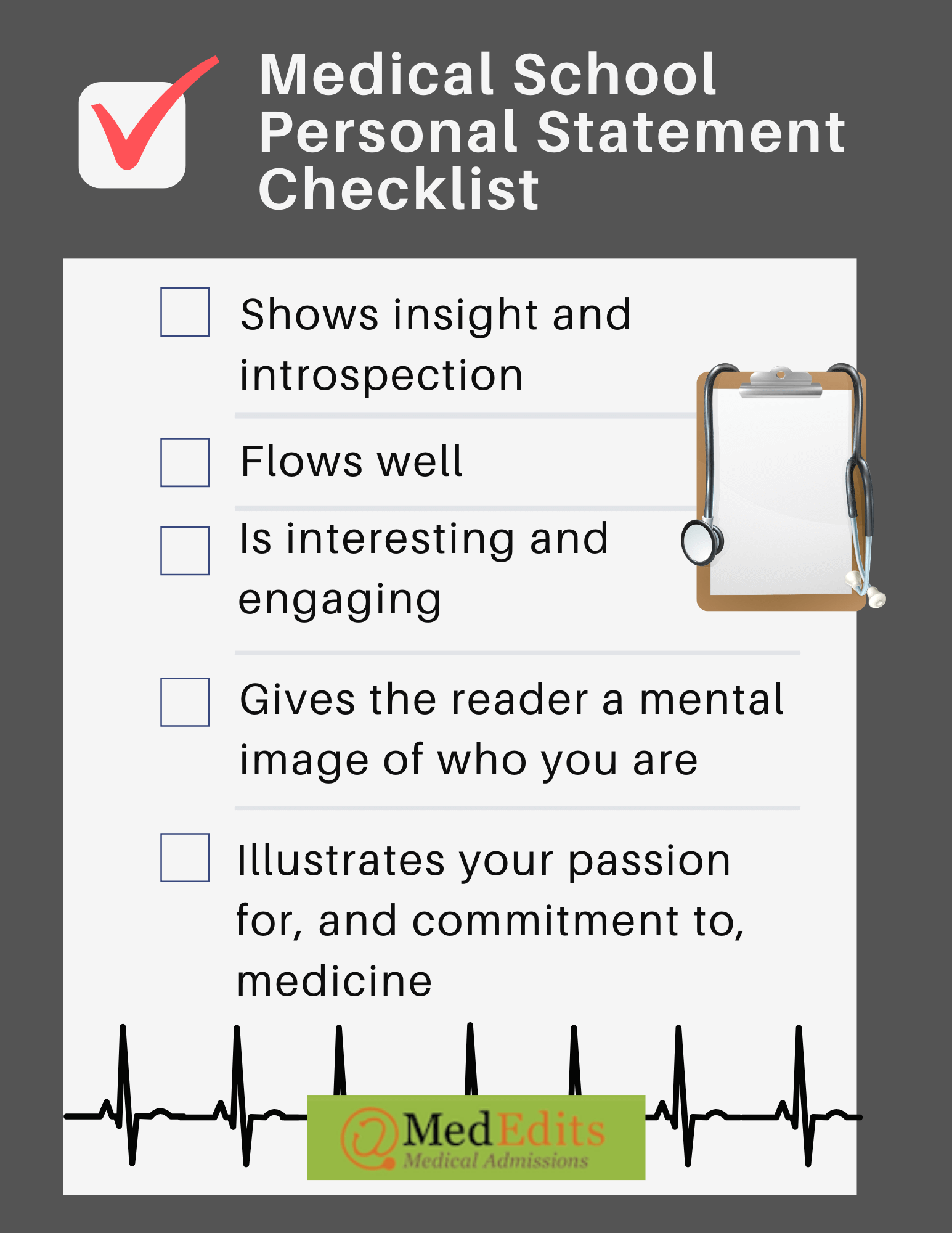
Your reader must be convinced that you are excited about and committed to a career in medicine! Above all, your personal statement should be about you. Explain to your reader what you have done and why you want to be a doctor with insight, compassion, and understanding.
Medical School Personal Statement Myths Also keep in mind some common myths about personal statements that I hear quite often: My personal statement must have a theme.Not true. The vast majority of personal statements do not have themes. In fact, most are somewhat autobiographical and are just as interesting as those statements that are woven around a “theme.” It is only the very talented writer who can creatively write a personal statement around a theme, and this approach often backfires since the applicant fails to answer the three questions above.
My personal statement must be no longer than one page.Not true. This advice is antiquated and dates back to the days of the written application when admissions committees flipped through pages. If your personal statement is interesting and compelling, it is fine to use the entire allotted space. The application systems have incorporated limits for exactly this reason! Many students, depending on their unique circumstances, can actually undermine their success by limiting their personal statement to a page. That said, never max out a space just for the sake of doing so. Quality writing and perspectives are preferable to quantity.
My personal statement should not describe patient encounters or my personal medical experiences.Not true. Again, the actual topics on which you focus in your personal statement are less important than the understanding you gained from those experiences. I have successful clients who have written extremely powerful and compelling personal statements that included information about clinical encounters – both personal and professional. Write about whichever experiences were the most important on your path to medicine. It’s always best, however, to avoid spending too much space on childhood and high school activities. Focus instead on those that are more current.
In my personal statement I need to sell myself.Not exactly true. You never want to boast in your personal statement. Let your experiences, insights, and observations speak for themselves. You want your reader to draw the conclusion – on his or her own – that you have the qualities and characteristics the medical school seeks. Never tell what qualities and characteristics you possess; let readers draw these conclusions on their own based on what you write.
Below are examples of actual medical school personal statements. You can also likely find medical school personal statements on Reddit.
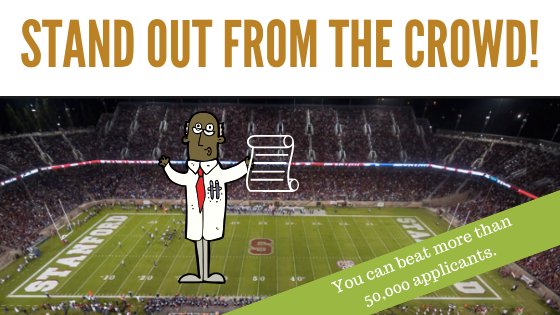
We will use Amy to illustrate the general process of writing an application to medical school, along with providing the resulting documents. Amy will first list those experiences, personal, extracurricular, and scholarly, that have been most influential in two areas: her life in general and her path to medical school. She will put this personal inventory in chronologic order for use in composing her personal statement.
She will then select those experiences that were the most significant to her and will reflect and think about why they were important. For her application entries, Amy will write about each experience, including those that she considers influential in her life but not in her choice of medicine, in her application entries. Experiences that Amy will not write about in her activity entries or her personal statement are those that she does not consider most influential in either her life or in her choice of medicine.
Amy’s personal inventory (from oldest to most recent)As you can see from Amy’s personal inventory list, she has many accomplishments that are important to her and influenced her path. The most influential personal experience that motivated her to practice medicine was her mother’s career as a practicing physician, but Amy was also motivated by watching her mother’s career evolve. Even though the death of her grandmother was devastating for Amy, she did not consider this experience especially influential in her choice to attend medical school so she didn’t write about it in her personal statement.
Amy wrote an experience-based personal statement, rich with anecdotes and detailed descriptions, to illustrate the evolution of her interest in medicine and how this motivated her to also earn a master’s in public health.
She was sprawled across the floor of her apartment. Scattered trash, decaying food, alcohol bottles, medication vials, and cigarette butts covered the floor. I had just graduated from college, and this was my first day on rotation with the forensic pathology department as a Summer Scholar, one of my most valuable activities on the path to medical school. As the coroner deputy scanned the scene for clues to what caused this woman’s death, I saw her distraught husband. I did not know what to say other than “I am so sorry.” I listened intently as he repeated the same stories about his wife and his dismay that he never got to say goodbye. The next day, alongside the coroner as he performed the autopsy, I could not stop thinking about the grieving man.
Discerning a cause of death was not something I had previously associated with the practice of medicine. As a child, I often spent Saturday mornings with my mother, a surgeon, as she rounded on patients. I witnessed the results of her actions, as she provided her patients a renewed chance at life. I grew to honor and respect my mother’s profession. Witnessing the immense gratitude of her patients and their families, I quickly came to admire the impact she was able to make in the lives of her patients and their loved ones.
I knew I wanted to pursue a career in medicine as my mother had, and throughout high school and college I sought out clinical, research, and volunteer opportunities to gain a deeper understanding of medicine. After volunteering with cancer survivors at Camp Ronald McDonald, I was inspired to further understand this disease. Through my oncology research, I learned about therapeutic processes for treatment development. Further, following my experience administering HIV tests, I completed research on point-of-care HIV testing, to be instituted throughout 26 hospitals and clinics. I realized that research often served as a basis for change in policy and medical practice and sought out opportunities to learn more about both.
All of my medically related experiences demonstrated that people who were ‘behind the scenes’ and had limited or no clinical background made many of the decisions in health care. Witnessing the evolution of my mother’s career further underscored the impact of policy change on the practice of medicine. In particular, the limits legislation imposed on the care she could provide influenced my perspective and future goals. Patients whom my mother had successfully treated for more than a decade, and with whom she had long-standing, trusting relationships, were no longer able to see her, because of policy coverage changes. Some patients, frustrated by these limitations, simply stopped seeking the care they needed. As a senior in college, I wanted to understand how policy transformations came about and gain the tools I would need to help effect administrative and policy changes in the future as a physician. It was with this goal in mind that I decided to complete a master’s in public health program before applying to medical school.
As an MPH candidate, I am gaining insight into the theories and practices behind the complex interconnections of the healthcare system; I am learning about economics, operations, management, ethics, policy, finance, and technology and how these entities converge to impact delivery of care. A holistic understanding of this diverse, highly competitive, market-driven system will allow me, as a clinician, to find solutions to policy, public health, and administration issues. I believe that change can be more effective if those who actually practice medicine also decide where improvements need to be made.
For example, as the sole intern for the emergency department at County Medical Center, I worked to increase efficiency in the ED by evaluating and mapping patient flow. I tracked patients from point of entry to point of discharge and found that the discharge process took up nearly 35% of patients’ time. By analyzing the reasons for this situation, in collaboration with nurses and physicians who worked in the ED and had an intimate understanding of what took place in the clinical area, I was able to make practical recommendations to decrease throughput time. The medical center has already implemented these suggestions, resulting in decreased length of stays. This example illustrates the benefit of having clinicians who work ‘behind the scenes’ establish policies and procedures, impacting operational change and improving patient care. I will also apply what I have learned through this project as the business development intern at Another Local Medical Center this summer, where I will assist in strategic planning, financial analysis, and program reviews for various clinical departments.
Through my mother’s career and my own medical experiences, I have become aware of the need for clinician administrators and policymakers. My primary goal as a physician will be to care for patients, but with the knowledge and experience I have gained through my MPH, I also hope to effect positive public policy and administrative changes.
What’s Good About Amy’s Medical School Personal Statement:Paragraphs 1 and 2: Amy started her personal statement by illustrating a powerful experience she had when she realized that medical caregivers often feel impotent, and how this contrasted with her understanding of medicine as a little girl going with her mother to work. Recognition of this intense contrast also highlights her maturity.
P-3: She then “lists” a few experiences that were important to her.
Paragraph 4: Amy describes the commonality in some of her experiences and how her observations were substantiated by watching the evolution of her mother’s practice. She then explains how this motivated her to earn an MPH so she could create change more effectively as a physician than as a layman.
P-5: Next, she explains how her graduate degree is helping her to better understand the “issues in medicine” that she observed.
Paragraph 6: Then, an exceptional accomplishment is described, highlighting what she has learned and how she has applied it.
P-7: Finally, she effectively concludes her personal statement and summarizes the major topics addressed in her essay.
As you can see, her statement has excellent flow, is captivating and unusual, and illustrates her understanding of, and commitment to, medicine. Throughout her application entries and statement, she exhibits the personal competencies, characteristics, and qualities that medical school admissions officers are seeking. Her application also has broad appeal; reviewers who are focused on research, cultural awareness, working with the underserved, health administration and policy, teaching, or clinical medicine would all find it of interest.